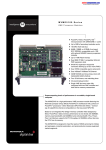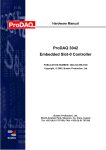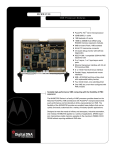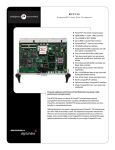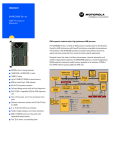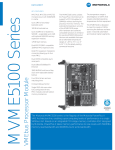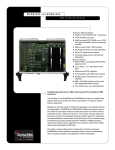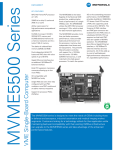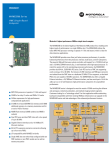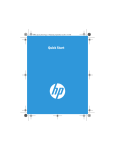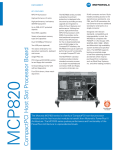Download Data Sheet - US Technologies
Transcript
MVME5100 Series VME Processor Modules ♦ PowerPC 7400 or PowerPC 750™ microprocessor with 32KB/32KB L1 cache ♦ 1MB of secondary backside cache ♦ 100 MHz front-side bus ♦ 64MB, 128MB, or 512MB of on-board ECC SDRAM—expandable up to 1GB with optional RAM500 memory expansion modules ♦ Up to 17MB Flash memory ♦ Dual IEEE P1386.1 compatible 32/64-bit PMC expansion slots ♦ 64-bit PCI expansion mezzanine connector allowing up to four more PMCs ♦ Dual 16550 compatible async serial ports ♦ Dual 10BaseT/100BaseTX Ethernet ♦ 32KB NVRAM and time-of-day clock with replaceable battery backup ♦ Four 32-bit timers, one watchdog timer ♦ On-board debug monitor ♦ Single VME slot even when fully configured with two PMC modules and both add-on memory mezzanines Supercomputing levels of performance in a scalable, single-board computer The MVME5100 is a high-performance VME processor module featuring the Motorola Computer Group (MCG) PowerPlus II architecture with a choice of PowerPC® processors—either Motorola’s MPC7400 with AltiVec™ technology for algorithmic-intensive computations or the low-power MPC750. Based on an integrated PCI bridge–memory controller ASIC designed by MCG, PowerPlus II takes memory performance to new levels with 582MB/s memory read bandwidth and 640MB/s burst write bandwidth. Plus, PowerPlus II architecture supports full PCI throughput of 264MB/s without starving the CPU from its memory. The MVME5100 is designed to meet the needs of OEMs servicing the military and aerospace, industrial automation, and semiconductor process equipment market segments. SDRAM Expansion 256MB PMC P11 & P12 Serial PIB RJ-45 16550 WB-554 ISA BUF X-Bus +3.3V REG RTC NVRAM 64-bit/33 MHz Local PCI Bus FP I/O PCI Expansion PMC2 Super I/O ESCC CIO LSI National 85230 8536 82559ER FP I/O PMC1 SCSI Ethernet VME Ethernet Universe2B 82559ER Rows A & C 64-pins Rows D & Z 46-pins P2 RJ-45 RJ-45 P1 MVME5100 Block Diagram MVME5100 P2 I/O MVME5100 P2 I/O I/O Compatibility Historically, MCG has offered two tracks in its PowerPC VME portfolio. The first track (which includes the MVME2600/2700) provides typical single-board computer I/O features including Ethernet, SCSI, multiple serial ports, a parallel port, and a single PMC slot. The on-board I/O is routed to P2 and made available to the user via MCG’s MVME761 or MVME712M transition boards. The second track (which includes the MVME2300/2400) offers limited on-board I/O (Ethernet and a single serial port both via the front panel) but provides dual PMC slots enabling maximum user I/O customization. The MVME5100 merges the best features of both tracks enabling the OEM to support varying I/O requirements with the same base platform, simplifying part number maintenance, technical expertise requirements, and sparing. P2 I/O Modes The MVME5100 supports two, jumper-configurable P2 I/O modes, PMC mode and IPMC mode. PMC mode is backward compatible with the MVME2300/ MVME2400. In PMC mode, 64 pins from PMC Slot 1 and 46 pins from PMC Slot 2 are available on P2 for PMC rear I/O. In IPMC mode, the MVME5100 supports legacy MVME761 or MVME712M I/O modules (with limited PMC I/O) when an IPMC761 or IPMC712 PMC card is populated in PMC Slot 1. In this configuration, PMC Slot 2 contains some signals that are reserved for extended SCSI. IPMC Modules The IPMC761 and IPMC712 are optional add-on PMC modules that provide backward compatibility with previous-generation MCG products (such as MVME2600 and MVME2700) P2 MUX PAL (IPMC761) P2 MUX 100 MHz Memory Bus Parallel Hawk ASIC Flash 16MB Serial 16550 SER3 Sync (761) Async (712) ECC SDRAM 64, 128 or 512MB PCI COM2 Vcore REG 64 or 256MB MPC7400 MPC750 Serial COM1 60x Arbiter Flash 1MB SER4 (Sync) SDRAM Expansion 16-bit SCSI L2 Cache 1MB PMC P14 & P15 IPMC Block Diagram using the MVME761 or MVME712M transition board. IPMC modules provide rear I/O support for • one single-ended Ultra Wide SCSI port • one parallel port • four serial ports (2 or 3 async and 1 or 2 sync/async, depending on module) With this PMC card configuration, the memory mezzanine, one PMC slot, and the PMCspan are still available, providing support for OEM product customization. Transition Mo dules Tr a n s i t i o n M o d u l e s MVME761 The MVME761 transition module provides industry-standard connector access to the IEEE 1284 parallel port, a 10BaseT or 100BaseT port via an RJ-45 connector, two DB-9 connectors providing access to the asynchronous serial ports configured as EIA-574 DTE, and two HD-26 connectors providing access to the sync/async serial ports. These serial ports, labeled as Serial 3 and Serial 4 on the faceplate of the MVME761, are individually user-configurable as EIA-232, EIA-530, V.35, or X.21 DCE or DTE via the installation of Motorola Serial Interface Modules (SIMs). A P2 adapter provides interface module signals to the MVME761 transition module. The 3-row P2 adapter can be used for 8-bit SCSI. A 5-row P2 adapter supports 16-bit SCSI and PMC I/O. MVME712M The MVME712M transition module provides industry-standard connector access to the Centronics® parallel port, a narrow SCSI port, and four DB-25 connectors providing access to the asynchronous/synchronous serial ports jumper configurable as EIA-232 DCE or DTE. A P2 adapter provides inter- face signals to the MVME712M transition module. The 3-row P2 adapter can be used for 8-bit SCSI. To gain access to the additional user definable I/O pins provided via the 5-row VME64 extension connector, a special P2 adapter board is available. This adapter panel replaces the traditional 3-row P2 adapter and extends its capability by providing access to the PMC I/O pins. Read Access (1MB port): Cell Storage Life: Firmware Monitor Firmware must fulfill the traditional functions of test and initialization and provide operating system boot support. The MVME5100 firmware monitor exceeds these requirements with a proven monitor from the embedded VME leader. It expands features like power-up tests with extensive diagnostics, as well as a powerful evaluation and debug tool for simple checkout or when high-level development debuggers require additional support. All this is included with the MVME5100 firmware; plus it supports booting both operating systems and kernels. Operating Systems and Kernels MVME5100 supports booting a variety of operating systems including a complete range of real-time operating systems and kernels which may be purchased from the following companies: VxWorks Read Access (16MB port): Capacity: Software Support Multiple Partners: Type: Capacity: EEPROM, on-board programmable 1MB via two 32-pin PLCC/CLCC sockets; 16MB surface mount 70 clocks (32-byte burst) 262 clocks (32-byte burst) NVRAM Software Support Wind River Systems, Inc.: Flash Memory ® Cell Capacity Life: Removable Battery: 32KB (4KB available for users) 50 years at 55° C 5 years at 100% duty cycle, 25° C Yes Counters/Timers TOD Clock Device: Real-Time Timers/ Counters: Watchdog Timer: M48T37V Four, 32-bit programmable Time-out generates reset VMEbus ANSI/VITA 1-1994 VME64 (IEEE STD 1014) Controller: DTB Master: DTB Slave: Arbiter: Interrupt Handler/ Generator: System Controller: Location Monitor: Tundra Universe A16–A32; D08–D64, BLT A24–A32; D08–D64, BLT, UAT RR/PRI IRQ 1–7/Any one of seven IRQs Yes, jumperable or auto detect Two, LMA32 Ethernet Interface Linux® Controller: Interface Speed: Speci fi cations PCI Local bus DMA: Specifications Connector: MVME5100 Processor Module MVME5100 Processor Module Two Intel 82559ER 10/100Mb/s Yes, with PCI burst One routed to front panel RJ-45, one routed to front panel RJ-45 or optionally routed to P2, RJ-45 on MVME761 Asynchronous Serial Ports Processor Controller: Microprocessor: MPC7400 MPC750 Number of Ports: Clock Frequency: 400 MHz 450 MHz Configuration: On-chip Cache (I/D): 32K/32K 32K/32K 1MB 1MB Async Baud Rate, bps max.: Secondary Cache: Connector: Main Memory Type: PC100 ECC SDRAM with 100 MHz bus Capacity: 64MB, 128MB, or 512MB on board, expandable to 1GB with RAM500 memory mezzanines Single Cycle Accesses: 10 Read/5 Write Read Burst Mode: 7-1-1-1 idle; 2-1-1-1 aligned page hit Write Burst Mode: 4-1-1-1 idle; 2-1-1-1 aligned page hit Architecture: 64-bit, single interleave 16C550C UART Two, 16550 compatible EIA-574 DTE 38.4K EIA-232, 115Kbps raw One routed to front panel RJ-45, one on planar for development use Dual IEEE P1386.1 PCI Mezzanine Card Slots Address/Data: PCI Bus Clock: Signaling: A32/D32/D64, PMC PN1, PN2, PN3, PN4 connectors 33 MHz 5V Power: +3.3V, +5V, ±12V; 7.5 watts maximum per PMC slot Module Types: Two single-wide or one double-wide, front panel or P2 I/O Parallel Port PCI Expansion Connector Address/Data: Controller: A32/D32/D64 PCI Bus Clock: 33 MHz Signaling: 114-pin connector located on the planar of the MVME5100 (not including power required by PMC or IMPC modules) +5V ± 5% +12V ± 10% –12V ± 10% NA 8 mA typ. NA MVME5100 with MVME761: 3.2 A typ., 0.2 A typ. 0.1 A typ. 4.0 A max. 0.5 A max. 0.3 A max. Note: –12V power is not used on the MVME5100 but is supplied for use by other devices (such as PMC and transition modules); requirements vary by device. Board Size Height: 233.4 mm (9.2 in.) Depth: 160.0 mm (6.3 in.) Width: Max. Component Height: Modes: (additional power load placed on MVME5100 with IPMC installed) IPMC761 IPMC712 +5V: +3.3V 0.5 A max. TBD 0.75 A max. TBD Transition Mo dules Transition Modules I/O Connectors MVME761 Three, DB-25 labeled as Serial 1, Serial 2, and Serial 3 Synchronous Serial Ports: Two HD-26 labeled as Serial 3 and Serial 4 (user configurable via installation of SIMs), Two 60-pin connectors on MVME761 planar for installation of two SIMs One, DB-25 labeled as Serial 4 Parallel Port: HD-36, Centronics compatible D-36, Centronics compatible Ethernet: 10BaseT or 100BaseTX, RJ-45 not available 8- or 16-bit, 50- or 68pin connector via P2 adapter 8-bit, standard SCSI D50 261.8 mm (10.3 in.) 19.8 mm (0.8 in.) 14.8 mm (0.58 in.) IPMC Modules PMC Interface PCI Bus Clock: Signaling: Module Type: A32/D32/D64, PMC PN1, PN2, PN3, PN4 connectors 33 MHz 5V Basic, single-wide; P2 I/O SCSI: SCSI Bus Controller: Symbios 53C895A MVME712M Two, DB-9 labeled as COM1 and COM2 Asynchronous Serial Ports: IPMC Modules Address/Data: Master only Power Requirements Power Requirements Front Panel Height: 8-bit bi-directional, full IEEE 1284 support; Centronics compatible (minus EPP and ECP on MVME712M) 5V Connector: MVME5100: PC97307 Configuration: Board Size PCI Local Bus DMA: Yes, with PCI local bus burst Height: 233.4 mm (9.2 in.) Asynchronous (8-bit mode): 5.0MB/s Depth: 80.0 mm (3.1 in.) Ultra SCSI: Front Panel Height: 20.0MB/s (8-bit mode), 40.0MB/s (16-bit mode) Front Panel Width: Note: 16-bit SCSI operation precludes the use of some PMC Slot 2 signals. Number of Ports: Configuration: 85230/8536 Two (IPMC761); one (IPMC712) IPMC761: TTL to P2 (both ports), SIM configurable on MVME761; IPMC712: EIA-232 to P2 Baud Rate, bps max.: 2.5M sync, 38.4K async Oscillator Clock Rate (PCLK): 10 MHz/5 MHz Asynchronous Serial Ports Controller: Number of Ports: Configuration: Async Baud Rate, bps max.: 16C550 UART; 85230/8536 Two (IPMC761); three (IPMC712) EIA-574 DTE (IPMC761); EIA-232 (IPMC712) 38.4K EIA-232, 115Kbps raw MVME761: 19.8 mm (0.8 in.) MVME712M: 39.6 mm (1.6 in.) All Modules All Modules Synchronous Serial Ports Controller: 261.8 mm (10.3 in.) Environmental Temperature: Operating Nonoperating 0° C to +55° C (inlet air temp. w/forced air cooling) –40° C to +85° C Note: Minimum of 400 LFM (linear feet per minute) of forced air cooling is recommended for operation in the higher temperature ranges. Humidity (NC): Vibration: 5% to 90% 5% to 90% 2 Gs RMS, 20–2000 Hz random 6 Gs RMS, 20–2000 Hz random Demonstrated MTBF MVME761 Compatible I/O (based on a sample of eight boards in accelerated stress environment; results pending for IPMC712) Mean: 190,509 hours 95% Confidence: 107,681 hours IPMC761-001 MVME761-001 Transition module: Two DB-9 async serial port connectors, two HD-26 sync/async serial port connectors, one HD-36 parallel port connector, one RJ-45 10/100 Ethernet connector; includes 3-row DIN P2 adapter module and cable (for 8-bit SCSI) MVME761-011 Transition module: Two DB-9 async serial port connectors, two HD-26 sync/async serial port connectors, one HD-36 parallel port connector, and one RJ-45 10/100 Ethernet connector; includes 5-row DIN P2 adapter module and cable (for 16-bit SCSI); requires backplane with 5-row DIN connectors SIM232DCE or DTE EIA-232 DCE or DTE Serial Interface Module SIM530DCE or DTE EIA-530 DCE or DTE Serial Interface Module SIMV35DCE or DTE V.35 DCE or DTE Module SIMX21DCE or DTE X.21 DCE or DTE Serial Interface Module Safety All printed wiring boards (PWBs) are manufactured with a flammability rating of 94V-0 by UL recognized manufacturers. Electromagnetic Compatibility (EMC) Intended for use in systems meeting the following regulations: U.S.: FCC Part 15, Subpart B, Class A (non-residential) Canada: ICES-003, Class A (non-residential) This product was tested in a representative system to the following standards: CE Mark per European EMC Directive 89/336/EEC with Amendments; Emissions: EN55022 Class B; Immunity: EN50082-1 (results pending for configurations with IPMC712) Ordering Information Ordering Information All models of the MVME5100 are available with either VME Scanbe front panel (-01x1) or IEEE 1101 compatible front panel (-01x3). Part Number Description MPC750 configurations with 450 MHz MPC750, 17MB Flash, 1MB L2 cache MVME5100-013x 64MB ECC SDRAM MVME5100-016x 512MB ECC SDRAM MPC7400 configurations with 400 MHz MPC7400, 17MB Flash, 1MB L2 cache MVME5101-013x 64MB ECC SDRAM MVME5101-016x 512MB ECC SDRAM MPC7400 configurations with 400 MHz MPC7400, 17MB Flash, 2MB L2 cache MVME5101-2141 128MB ECC SDRAM I/O Modules MVME712M Compatible I/O IPMC712-001 Multifunction rear I/O PMC module; Ultra Wide SCSI, one parallel port, three async and one sync/async serial ports MVME712M Transition module connectors: One DB-25 sync/async serial port, three DB-25 async serial port, one AUI connector, one D-36 parallel port, and one 50-pin 8-bit SCSI; includes 3-row DIN P2 adapter module and cable Multifunction rear I/O PMC module; Ultra Wide SCSI, one parallel port, two async and two sync/async serial ports Related Products PMCSPAN-002 Primary 32-bit PCI expansion, mates directly to the MVME5100 providing slots for either two single-wide or one double-wide PMC cards; optional PMCSPAN-010 PMCSPAN-010 Secondary 32-bit PCI expansion, plugs directly into PMCSPAN-002 providing two additional PMC slots RAM500-004 Stackable (top) 64MB ECC SDRAM mezzanine RAM500-006 Stackable (top) 256MB ECC SDRAM mezzanine RAM500-016 Stackable (bottom) 256MB ECC SDRAM mezzanine Documentation V5100A/IH MVME5100 Installation and Use V5100A/PG Programmer’s Reference Guide VME761A/IH MVME761 Transition Module Installation and Use VME712MA/IH MVME712 Transition Module Installation and Use PPCBUGA1/UM PPCBUGA2/UM PPCDIAA/UM PPCBug Firmware Package User’s Manual (volumes one and two) PPCBug Diagnostics Manual Once released, documentation is available for online viewing and ordering at http://www.motorola.com/computer/literature. www.motorola.com/computer 1-800-759-1107 Motorola Computer Group Worldwide Headquarters: 2900 S. Diablo Way, Tempe, AZ 85282 Sales Offices: United Kingdom: +44 (0) 1256 790555 • Asia Pacific and Japan: 852-2966-3209 • France: +33 (0) 1 64 86 64 00 • Germany: +49 (0) 611-3611 604 • East Mediterranean: 972-3-610-4388 • Canada & Central Pan America: 888-366-3624 • Eastern Pan America: 703-714-0725 • Western Pan America: 408-991-8633 Motorola and the stylized M logo are registered trademarks and Altivec, DigitalDNA, and the DigitalDNA logo are trademarks of Motorola, Inc. PowerPC and the PowerPC logo are registered trademarks and PowerPC 750 is a trademark of International Business Machines Corporation and are used by Motorola, Inc. under license from International Business Machines Corporation. VxWorks is a registered trademark of Wind River Systems, Inc. Linux is a registered trademark of Linus Torvalds. Centronics is a registered trademark of Centronics Data Computer Corporation. All other product or service names are the property of their respective owners. This data sheet identifies products, their specifications, and their characteristics, which may be suitable for certain applications. It does not constitute an offer to sell or a commitment of present or future availability, and should not be relied upon to state the terms and conditions, including warranties and disclaimers thereof, on which Motorola may sell products. A prospective buyer should exercise its own independent judgement to confirm the suitability of the products for particular applications. Motorola reserves the right to make changes, without notice, to any products or information herein which will, in its sole discretion, improve reliability, function, or design. Motorola does not assume any liability arising out of the application or use of any product or circuit described herein; neither does it convey any license under its patent or other intellectual property rights or under others. This disclaimer extends to any prospective buyer, and it includes Motorola’s licensee, licensee’s transferees, and licensee’s customers and users. Availability of some of the products and services described herein may be restricted in some locations. ® Reg. U.S. Pat. & Tm. Off. © 1999, 2000 Motorola, Inc. All rights reserved. M5100-D6 12/00





